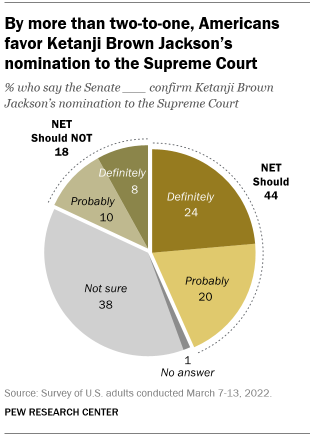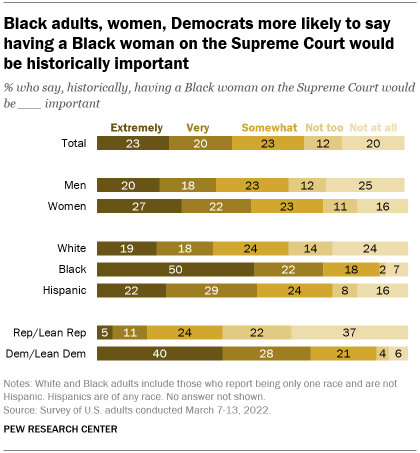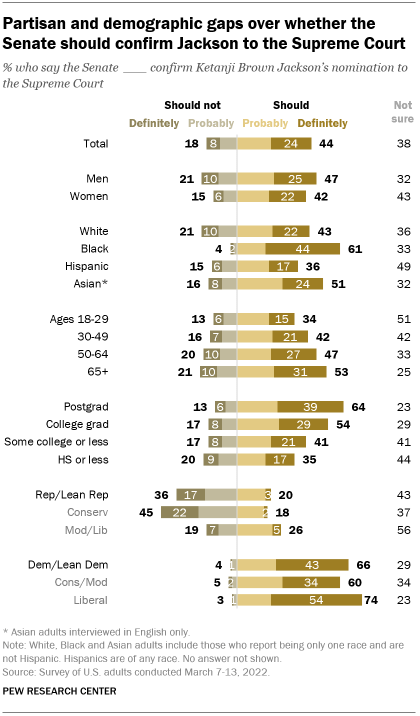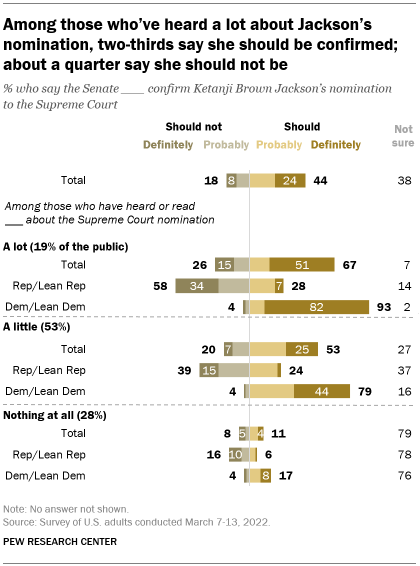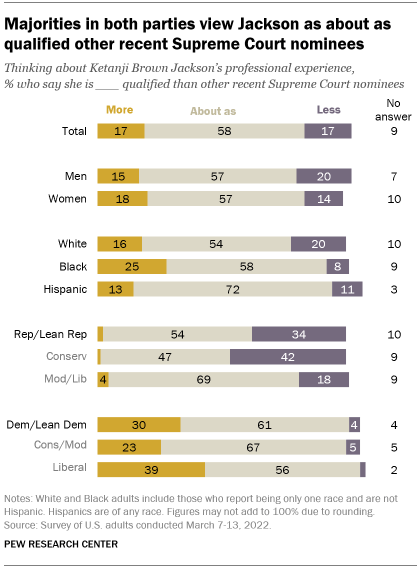
As the U.S. Senate is set to begin confirmation hearings for Judge Ketanji Brown Jackson, President Joe Biden’s nominee to replace the retiring Justice Stephen Breyer on the Supreme Court, 44% of the public says the Senate should definitely (24%) or probably (20%) confirm Jackson, while just 18% say she should not be confirmed. Nearly four-in-ten (38%) say they are unsure.
Pew Research Center conducted this study to gauge early public reactions to President Joe Biden’s Supreme Court justice nominee, Ketanji Brown Jackson. For this analysis, we surveyed 10,441 U.S. adults in March 2022. Everyone who took part in this survey is a member of the Center’s American Trends Panel (ATP), an online survey panel that is recruited through national, random sampling of residential addresses. This way nearly all U.S. adults have a chance of selection. The survey is weighted to be representative of the U.S. adult population by gender, race, ethnicity, partisan affiliation, education and other categories.
Read more about the ATP’s methodology.
Here are the questions used for the report, along with responses, and its methodology.
Early public reactions to Jackson’s nomination are similar to views of past nominees, which have tended to elicit more support than opposition, with relatively large shares not offering an opinion.
While roughly seven-in-ten U.S. adults (72%) say they have heard about the nomination, just 19% have heard “a lot” and 28% have heard “nothing at all,” according to a Pew Research Center survey conducted March 7-13 among 10,441 U.S. adults on the Center’s American Trends Panel.
If confirmed, Jackson would be the third Black person and the first Black woman to serve as a Supreme Court justice. About four-in-ten Americans say having a Black woman on the Supreme Court would be extremely (23%) or very historically important (20%), while an additional 23% say this would be somewhat important. About a third say this would be not too (12%) or not at all important historically (20%).
Black adults are significantly more likely than White and Hispanic adults to say having a Black woman on the court would be historically important, with 72% saying it would be extremely or very important, including half who say it would be extremely important. By comparison, 51% of Hispanic adults and 37% of White adults hold the view that having a Black woman on the Supreme Court would be extremely or very historically important.
Women are also more likely than men to say the confirmation of a Black woman to the Supreme Court would be historically important. About half of women (48%) say this would be extremely or very important, compared with 38% of men.
Partisans hold significantly different views on whether having a Black woman on the Supreme Court would be historically important.
Nearly seven-in-ten Democrats and Democratic-leaning independents (68%) say it would be extremely (40%) or very historically important (28%) for a Black woman to be on the Supreme Court. By contrast, 15% of Republicans and GOP leaners hold this view. The majority of Republicans say this would be not too (22%) or not at all (37%) historically important. Roughly two-in-ten Democrats (21%) and Republicans (24%) say it would be somewhat historically important.
While there is more support than opposition to Jackson’s nomination across racial and ethnic groups, Black adults are particularly likely to say the Senate should confirm Jackson to the Court: 61% say she should definitely or probably be confirmed, with 44% saying she should definitely be confirmed – just 4% say she should not be confirmed. Smaller shares of Asian (51%), White (43%) and Hispanic (36%) adults say the Senate should confirm Jackson.
Roughly half of Hispanic adults (49%) say they are not sure whether the Senate should or should not confirm Jackson to the Court – 42% of this group says they have heard nothing at all about the nomination, a larger share than among other racial and ethnic groups.
While the balance of support for Jackson’s nomination is similar across age groups, younger adults are more likely to say they are not sure.
As with past Supreme Court nominations, there is a wide partisan gap over whether the Supreme Court should confirm Jackson. Today, two-thirds of Democrats support her confirmation, while just 4% say they do not. About three-in-ten Democrats say they are unsure.
While Republicans are more likely to say the Senate should not confirm Jackson than to say that it should (36% vs. 20%), they are also substantially more likely than Democrats to say they are unsure about whether the Senate should confirm Jackson to the Court (43% vs. 29% of Democrats). Among Republicans who express a view, conservative Republicans are more than twice as likely to oppose rather than support Jackson’s confirmation (45% say the Senate should not confirm her, 18% say it should). Moderate and liberal Republicans are more divided: 26% say Jackson should be confirmed, while 19% say she should not be.
Those who have heard a lot about the nomination are far more likely than others to offer an opinion: Overall, 67% of this group says Jackson should be confirmed, while 26% say she should not be, and just 7% of say they are not sure.
About nine-in-ten Democrats (93%) who have heard a lot about the nomination (representing about 21% of all Democrats) say the Senate should confirm her as a justice, including 82% who say they should definitely confirm her.
Among Republicans who have heard a lot about the nomination (about 17% of all Republicans), 58% say she should not be confirmed by the Senate. About three-in-ten Republicans who say they have heard a lot about her nomination (28%) say the Senate should probably or definitely confirm Jackson to the role of Supreme Court justice.
Still, even among those who have heard a lot about the nomination, Republicans are more likely than Democrats to say they are not sure whether the Senate should or should not confirm Jackson (14% vs. 2%).
About six-in-ten U.S. adults think Jackson is about as qualified as other recent Supreme Court justice nominees, while 17% say she is more qualified and an identical share say she is less qualified than other recent nominees.
Assessments of Jackson’s readiness for the role on the high court differ only modestly by gender, race and ethnicity, and across other demographic groups.
While majorities of both Republicans (54%) and Democrats (61%) say she is about as qualified as other candidates, there are still some differences by partisanship.
Three-in-ten Democrats say Jackson is more qualified for the Supreme Court than other recent nominees, including 39% of liberal Democrats and 23% of conservative and moderate Democrats.
By contrast, a third of Republicans say Jackson is less qualified than other recent candidates – a view held by 42% of conservative Republicans and 18% of moderate and liberal Republicans.
Note: Here are the questions used for the report, along with responses, and its methodology.
